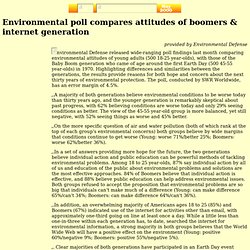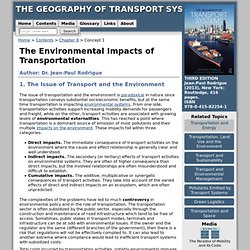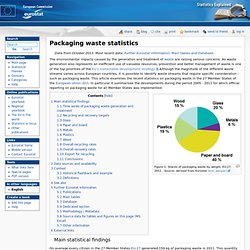

SCJ+and+GfK+Roper+Green+Gauge. Generation X on climate change: Meh. July 17, 2012 Preoccupied with careers and families, the Gen Xers – adults in their 30s and 40s – remain almost as indifferent to climate change impacts as their parents By Brett IsraelThe DailyClimate.org Generation X may not be the stereotypical slackers of those '90s cult classic movies, but here's one issue they have trouble caring about: climate change.

The generation that was once poked fun at in pop culture for being underachieving slackers has grown into an educated, wired and scientifically literate generation. But record-breaking heat waves, epic droughts and killer tornadoes haven't sounded the climate change alarm for these adults, aged 32 to 52, according to a University of Michigan report released on Tuesday. With careers, families and kids, Gen X just has bigger concerns, the long-term survey found. They're busy and they don't sit around evenings studying the carbon budget. - Jon D.
"The climate crisis can't be solved in 140 characters," Patzert said. Haq_et_al_Global_aging_and_environment__2013. ET 05/00: Environmental poll compares attitudes of boomers & internet generation. Nvironmental Defense released wide-ranging poll findings last month comparing environmental attitudes of young adults (500 18-25 year-olds), with those of the Baby Boom generation who came of age around the first Earth Day (500 45-55 year-olds) in 1970.

Highlighting differences and similarities between the generations, the results provide reasons for both hope and concern about the next thirty years of environmental protection. The poll, conducted by SWR Worldwide, has an error margin of 4.5%. A majority of both generations believe environmental conditions to be worse today than thirty years ago, and the younger generation is remarkably skeptical about past progress, with 62% believing conditions are worse today and only 29% seeing conditions as better. The view of the 45-55 year-old group is more balanced, yet still negative, with 52% seeing things as worse and 45% better. Is Gen Y Just Pretending To Care About The Environment? We’ve heard it over and over: people under 30 are more eco-conscious than their parents and millennials are more concerned about their environmental impact than previous generations.

At first glance, this makes sense: Gen Y is connected and aware in ways Baby Boomers never were. They know about industrial pollution and the Great Pacific Garbage Patch. They shop at Whole Foods, wear organic clothing and shun bottled water. But does all that really translate into being better stewards of the planet? Recent research shows that, despite the belief that the Millennial generation is particularly passionate about environmental issues, there are few, if any, differences in their level of concern about the environment or the importance they place on responsible behavior versus the Boomer generation. The DDB Life Style Study, the nation’s longest running and largest longitudinal study of attitudes and behaviors, surveyed 6,429 adult respondents during the month of January 2013. 20767-67741-1-SM. 7f991e2a-9b1d-4949-abf0-0f34c471cd7d. 12_Early_findings_Chapter_12. Green & Ethical Consumer 2013.
Colour Connections: Textile Consultancy. Global Action Through Fashion. THREAD Documentary. The Environmental Impacts of Transportation. The issue of transportation and the environment is paradoxical in nature since transportation conveys substantial socioeconomic benefits, but at the same time transportation is impacting environmental systems.

From one side, transportation activities support increasing mobility demands for passengers and freight, while on the other, transport activities are associated with growing levels of environmental externalities. This has reached a point where transportation is a dominant source of emission of most pollutants and their multiple impacts on the environment.
These impacts fall within three categories: Direct impacts. The immediate consequence of transport activities on the environment where the cause and effect relationship is generally clear and well understood. The complexities of the problems have led to much controversy in environmental policy and in the role of transportation. Waste Couture: Environmental Impact of the Clothing Industry. Packaging waste statistics. Data from October 2013.

Most recent data: Further Eurostat information, Main tables and Database. Figure 1: Shares of packaging waste by weight, EU-27, 2011 - Source: derived from Eurostat (env_waspac) Main statistical findings On average every citizen in the 27 Member States EU-27 generated 159 kg of packaging waste in 2011. This quantity varied between 43 kg and 216 kg per capita across European countries. Time series of packaging waste generation and treatment Figure 2: Development of packaging waste generated, EU-27, 2005-2011 (million tonnes) - Source: Eurostat (env_waspac) What we do. Environmentally Conscious Materials and Chemicals Processing.